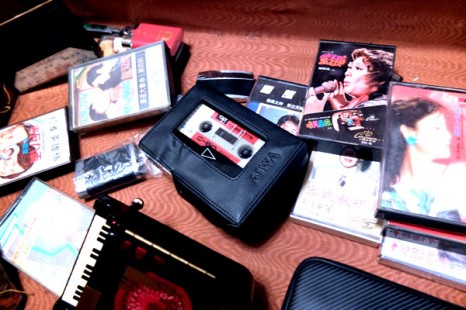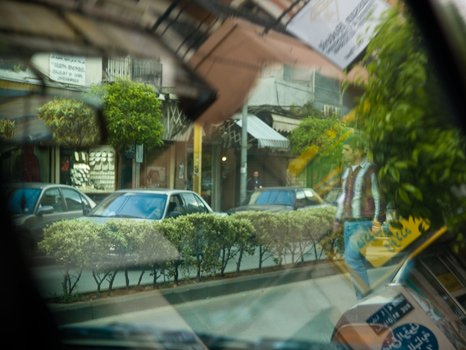24 july 2013,西湾 saiwan beach,2:00 am
24 july 2013,西湾 saiwan beach from under my tent,maybe around 6 am
02 august 2013,soundwalk in 贵阳 guiyang city,around 9:30 pm
19 august 2013,music to boost worker morale,肇兴 zhaoxing town,around 11 am
20 august 2013,芦笙 battle,肇兴 zhaoxing town,9:39 pm
“ç«é¾™æžœä¹‹æŒ dragon fruit song”,from the forthcoming album ã€Šåœ¨ä½ é¢å‰å¾ˆæ— 邪 No Evil Before You 》by å™å¤§è‚† Joy SUN
from the 三行實驗室 three lines laboratory
å‚åŠ äº†ä¸‰å€‹è‰ºæœ¯å®¶èˆ‰è¾¦çš„â€œä¸‰è¡Œå¯¦é©—å®¤â€å·¥ä½œåŠï¼Œæ¯ä¸€å€‹åƒèˆ‡è€…寫了一個三行詩給å¦å¤–一個ä¸ä¸€å®šèªè˜çš„人,在ç£å¸¶ä¸Šæœ—讀錄音。æ¯ä¸€å€‹äººéŒ„完之後,組織者收集了åˆæŒ‰ç…§äººåé‡æ–°ç™¼çµ¦æ¯ä¸€å€‹äººå¯«çµ¦ä»–的三行朗讀。發完組織者說“好,那我們今天就這樣çµæŸå•¦ï¼Œä½ è¦è‡ªå·±å›žå®¶å¾Œæ‰¾æ–¹æ³•æ’æ”¾ä½ çš„ç£å¸¶â€ã€‚當然家裡沒有,ä¸çŸ¥é“è¦ç‰å¤šä¹…æ‰èƒ½è½åˆ°é€™é¦–詩就拿著這個神秘的å°ç£å¸¶èµ°ã€‚
工作åŠä¹‹å¾ŒåŽ»æ‰¾æˆ‘姑å§ä¸€èµ·åƒé£¯ï¼Œå¥¹å‘Šè¨´äº†æˆ‘大伯éŽä¸–了。第二天她和其他阿伯去收拾大伯的屋,è¦æº–備把他30年一個人ä½çš„房å還給政府。他們回來之後給我一個è€è¡ŒæŽç®±ï¼Œè£¡é¢æ”¾äº†ä¸€äº›å¤§ä¼¯çš„æ±è¥¿ã€‚å…¶ä¸æœ‰ä¸€å€‹å°AIWA放音機, 外殼壞了但是還能用。è½äº†ä½ 給我寫的三行詩,è½åˆ°åœ¨é‚£ä¸‰è¡Œä¹‹é–“æˆ‘å’Œä½ ä¹‹é–“çš„è·é›¢ï¼Œä¹Ÿè¨±ä¹Ÿå°±æ˜¯é€™å€‹åœ°çƒä¸Šçš„æ¯ä¸€å€‹äººèˆ‡å¦å¤–一個人的è·é›¢ã€‚

i wish i knew how it feels to be free
thank you to king689soulclassics
we wrote twice last year. growing smaller in our livelihood. making reparations, finding ourselves present, losing words of reflection for bullshit become routine. it’s an alienating experience to observe others speaking in endless strings of aphorism and cliché, like miraculously knowing the code for things that you did not care to know about. flooded gates . cinema and the sound of air conditioning . the ballad of the broken birdie records, that was forever.
you can describe things, but you cannot tell them.
she said we made it up to overcome change, that forever . because the passing arcs of the sun and moon were just too much. the drummer’s steady hands were deceiving, when it had only been about the joy and trauma of difference that really counted . “difference and deferral” . counting . rational concepts . and a one. and a one.
like a new way of seeing something.
two, three. counting and singing again, rushing into nines and ten. time was not the matter at hand, and i could only otherwise imagine some kind of spatial parameter (cigarette, balcony, distance from one apartment to another), but of course it’s less rational than that, our descriptions are as infinite as desire. we’ll be é è°± one day.
it sounds too prescribed, doesn’t it——sticking to the score——exactly what we didn’t want. so instead we became impulsive, 花心 flowery hearts, the wallow, those hands grabbing at your face, fear, the sort.  no……please ask me to write songs instead, wait for that moment of forever . two times a year at least.
Posted by 丫 | more »What can a phrase such as ‘natural course’ mean anymore in a time of such intense production?


At one point during one of our discussions, Jad mentioned something about the need to build systems and structures so that we can break free from them. At the time i did not agree so much, perhaps out of mere exhaustion (the dialectic), and maybe also there has just always been some part of me that desires to find out how far we can just let things go, or to understand the limits of tolerance.
Phasing works in a similar way, though taking a walk in the city makes a clean set of variables into a dirty game. The phase is an easy, fun experiment; it breaks out of itself predictably but still fascinating to listen to — self-contained by reception. But it seems difficult to consider any form of reality anymore in terms of such structure; what is always lies next to and around itself, everything is multiple. Perhaps it’s simply a poor understanding of mathematics, but I never know how to discern exponentiality from noise. Circling now (the dialectic), it’s another form of fascination — like listening to sound upon sound. Or maybe it’s simply the idea of being attentive to the things that have always been there.
This is an audio recording combining several journeys traced from an original route shared by Maral Der Boghossian, who has visited her father’s shop in Bourj Hammoud two to three times a week for over 25 years. At the time of this writing, not a single participant after Maral has been able to successfully follow the audio to reach the shop, and this reveals certain weaknesses in the structure of the game, but I guess it’s also just letting things follow their natural course.
//
Participants in the recording: Maral Der Boghossian, Jad Baaklini, Paul Gorra, George Haddad, Christophe Katrib (accidentally powered off), Céline Khairallah, Lynn Kodeih, Fotini Lazaridou-Hatzigoga, Lina Sahab and the blacksmith around the corner from the tree that Maral’s grandmother planted some 40 years ago.

April 2011, Beirut
Posted by 丫 | more »å±•è§ˆé¢˜ä¸ºâ€œå¦‚何独处†The Title of the Show is ‘How to Be Alone’
1// 《但愿我能为您æ绘得更好》第二期里献给å‹åçš„æŒ: “èœå•ï¼é‚£ä¹ˆä»Šå¤œä½•å¤„是京都ï¼çŒ«å’ªé©¬ç³â€ï¼ˆæ¼”唱者:“声音å‘导â€ä¹é˜Ÿï¼Œå£°éŸ³ä»‹å…¥éƒ¨åˆ†ï¼šä½•é¢–é›…ã€ä½•äº¬è•´ï¼‰ From the publication iwishicoulddescribeittoyoubetter number two, for Tomoko: “Menu/So Where Is Kyoto Tonight?/Mullin The Mog” by DirectorSound with inserts by Elaine W. HO and Anouchka van DRIEL
2// “解手与生产â€ï¼Œå°è¯•ä¸ºé«˜çµå£å¤´ç¿»è¯‘Paul CHAN的文本 “Pee and Productionâ€, trying to orally translate a text by Paul CHAN to GAO Ling
3// 爸爸骑ç€æ‘©æ‰˜ï¼Œ å„¿åå在åŽåº§ä¸Šæ‰“ç€å¿«æ¿ï¼Œ 我们一起在儿童电影夜场å–了点酒,家作åŠ2010å¹´Â The boy comes home with his father playing kuaiban, we had been drinking at the kids’ movie night, HomeShop 2010
4// “ä½ å¥½å‘€ï¼ŒåŠ³ä¼¦æ–¯è€å¸ˆï¼” 这段对我外婆的采访录音是1991年我ä¸å¦åŽ†å²è¯¾ä¸Šçš„家åºä½œä¸šâ€”—“å£è¿°åŽ†å²â€ï¼Œæˆ‘妈妈也在“其间â€ã€‚ “Hellll-o Mizz Lawrence!” An oral history project, my grandmother, mother and me, 1991
5// 五å²çš„我,在数数和唱æŒÂ When I was 5 years old, counting and singing
6// 我在è´ä¹°çš„è¿·ä½ SDå¡ä¸Šæ‰¾åˆ°äº†70多首æŒï¼Œä»Žä¸é€‰äº†å首æŒå¹¶é€šè¿‡æ•°ç 处ç†ï¼ŒæŠŠå®ƒä»¬çš„节æ‹ç»Ÿä¸€æˆæ¯åˆ†é’Ÿ120æ‹ï¼ˆç‰¹æ®Šæ„Ÿè°¢Ryan KING在数ç 处ç†ï¼‰ Music found on the micro-SD cards purchased to create this work, whereby among 70 songs in total ten were chosen and digitally synced at 120 beats per minute (processing courtesy of Ryan KING)
—–
装置在《第三房:如何独处》展览,站å°ä¸å›½ï¼Œ2010å¹´11月11æ—¥ï¼2011å¹´1月24æ—¥
Installation part of The Third Party: How to Be Alone (or nowhere else am i safe from the question: why here?), on view at Platform China, 11 November 2010 – 24 January 2011
father’s father Posted by 丫 | reply »
THE WORK (for 絵美 and a friend of hers, and for everyone amidst iwishicoulddescribeittoyoubetter)
How could this be institutionalised? In describing, putting the words to entities, in finding vocabularies and knowing where to look, we are trapped already. How couldn’t we be? Should I write such that you never understand; should I make work that never needs to be seen; should anything other than question marks arise?
Is this a work? Would we rather toss it all off to a little game, scoff at those who take themselves too seriously, never be so ridiculous as to consider the nests of “art” and “life”? Are the words one is using as important as the to whom one is speaking? “What is the work of man?” And why not say it, invest oneself with intention, make the attempt? Flail? This is not an institution, as could it ever be, with time, with the fulfillment of certain criteria of Work. We are tied to a production as always, since before we were aware of it, since we were animals. And the guillotined bumblebee, as Agamben asks, is he as busy as ever, do we continue amidst work, does time fly when…?
Should anything other than question marks arise?
What-is-the-work?
Should the work be defined by a trade, a certain amount of craftsmanship, the ergon of man, a list of projects and venues to which one must be flown? Does work define our activities or does activity define work? Why should vita contemplativa be placed above vita activa in a society with no God? Is this the captivation of the bumblebee, are we productive enough, should we make particular dialogues in work-group fashion? Because if I play, or if i dangerously mix words like “art” and “life”, like you know, when
Every afternoon he goes there to see a big painting for two hours, and he says, ‘I’m doing the work to see the work’. That’s ok, I think it’s no problem. He did another work where he pays for three months of traditional Chinese music lessons, on the erhu. – 马永峰 MA Yongfeng, Forget Art
Can a situation be Work? Our particular arrangement to one another, did you try that out, were you networking? Is the amount of control in any given situation a Work? Is control a result of the fact that there is no one around to help us, or that we are ‘mere’ fascists? Is the controlled situation a place of God or science or politics? Why do you question, why go beyond captivation? What did you question, what did you create, where did you control the situation and where was spontaneity a lie? 艾未未 AI Weiwei calls it the “vocabulary” that “can also be the total meaning of the concept”; Pierre Huyghe says a one:to:one ratio of idea:to:form. These are control experiments, perhaps, but not without the certain seepages that blur the distances between the Work and our ethics, our politics——our everyday. We take ourselves too seriously. In the fullness of the situation, yes. And yes, he is right, we could not presume it to be so before its occurrence, where there is thus the very small moment when the lack of control has perchance to touch upon the work’s going beyond itself. An eventfullness…
Have we said too much already? Really, should anything other than question marks arise?
Are these thinly veiled treatises, and what have you really got to say?
Stopping oneself… (slow, slow loading, please be patient)
Posted by 丫 | more »ideas about karaoke
recorded at Lee Kit’s “Someone singing and calling your name”, december 2009
Posted by 丫 | reply »
